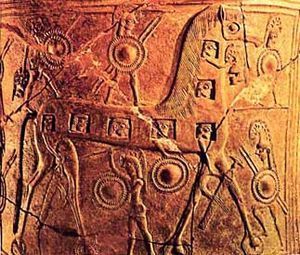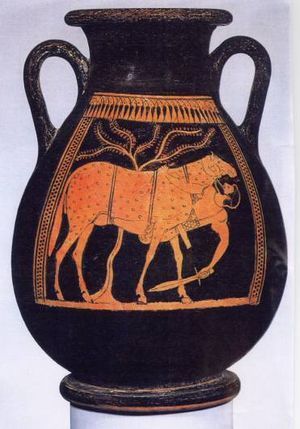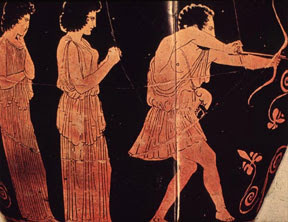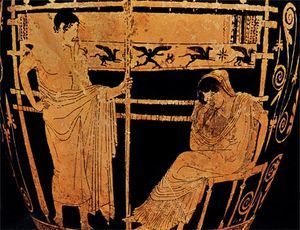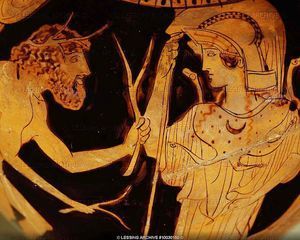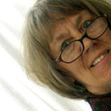Elizabeth Adams's Blog, page 92
September 17, 2012
Lindens: Two Haiku and a Tanka
Poems can be sketches too...
This street of lindens
weighted with clusters of fruit
brown cherries with wings
Great lindens weighted
with their brown wingèd clusters
and old memories.
These lindens have seen
so many pass beneath them --
we grow old,
stiffen --
they spread their green arms wider
murmuring intercessions
September 12, 2012
Sunflowers in a Blue Vase

Sunflowers in a blue vase, 199x? 14"x 20"
It feels just like back-to-school here: September began, and all of a sudden everything and everybody ramped up. So since I haven't had time to write anything, I thought I'd post a watercolor from almost twenty years ago. These are sunflowers I grew in my Vermont garden, where in late August and September I always had a big group of them nodding outside my studio window. Except for the ones that made their way into the house or the studio, we left them in the garden for the goldfinches and purple finches to feast on, and enjoyed watching the birds as much as the flowers.
I'm also remembering my great-aunt Inez today; this is the week of her birthday (she would have been about 115!) and she was a very good watercolorist who loved to paint flowers too.
I really like this expressive, free style of watercolor; I was just starting to get comfortable and free with it when I stopped painting very much and began writing more. Right now, I don't know quite how I'm going to keep working at either my art and writing this fall; it certainly won't be with the same focus as this summer. We've got a bunch of professional work to do, Phoenicia has more books coming out before Christmas, choir has begun again, I'm teaching/leading monthly meditation at the cathedral, and there's company coming for various visits starting tomorrow, and a couple of short trips out of town for us as well.
However, in the spirit of last night's first meditation session: deep breaths, calmness, and a reminder-to-self, via the sunflowers, that everything is fine, just as it is, right this moment.
September 10, 2012
Some Recent Micropoems
The anemones
choke the delphiniums
to prove my absence
--
The claws, the protest --
in five minutes she is curled
a purring comma
beside my guilty conscience
--
Oh! Mosquito bite
on my scalp, I cannot
wash you away!
--
The artist's struggle --
A restless finger blurring
wakefulness from sleep
--
Winnepesauke:
my friends and husband text me
Cold today, they say
We fell asleep listening
to the cry of the loons
--
I click the shutter
on my old paintings and find
myself in the lens.
--
Unmistakable
the homeless man sees it first --
the wet crimson stain
--
A rare rainy day --
a question in the spaces
between dawn's grey clouds
--
Aging bananas
the two last yellow peaches
and three fast fruit flies
September 7, 2012
Summer Fields, Summer Sale, Summer Lessons

Summer fields, Paris Hill, NY 6"x 4" (detail)
Like my publishing business, having an online gallery is proving to be a pretty interesting experiment, both inner and outer. Some work has sold, but at this venue in particular, it seems like most people are looking for items that are affordable; here that means $20 - $50. Prints are one option, as are very small works. I'm trying both, and have just reduced the prices on all my spring and summer paintings. I've had to set up yet another accounting system, figure out the international shipping, devise lightweight mailers, work regularly on the online shop -- all that stuff that goes with having a business, but fortunately I don't mind that; having a business is familiar territory, it's the online marketing that is different, whether it's publishing or art or music or whatever.
On the inside, though, I think even more has changed. For so many years, my "career identity" was "graphic designer." As we transition from doing design and communications pretty much fulltime into a broader mix of activities that includes an emphasis on art and writing for me, the direct relationship of money-to-work is changing a lot. The work I've done with my partner all our professional life was intense and demanding, with tight deadlines and a lot of financial/supervisory responsibility for making sure things went properly -- but it was well paid. It also had a social component: long-term relationships with clients and suppliers, and the interesting psychological side of understanding what people were looking for and giving it visual expression. We received some verbal appreciation, to be sure, but that was never a major part of the equation or the motivation.
It's challenging for me to do work now that is just as difficult and demanding, or even more so, but almost entirely self-motivated, with little chance of financial reward. Whether it's publishing books or writing my own words, or doing artwork, I'm doing it for one primary reason: because I want to. I wonder if, without the internet, I'd find it too isolating: I think the social aspect was a major factor why I turned toward graphic design and having a business long ago. I'm a person who likes and needs solitude, but I'm not an introvert.
We're all getting used to sharing our art and writing online these days, maybe even taking it for granted, but I remember how isolated and lonely I used to feel. It bothers me that it's become so difficult for artists and writers to make a living from their work -- it was always difficult, but much mroe so now -- and the internet has added to the perception that art is free. In an ideal work art would indeed be free, but artists would be supported and valued by the society at large. In the meantime, people are scrambling, and no one knows how it will all shake out. It's a struggle some days to keep from feeling discouraged, whether personally, or about the many talented writers and artists I'm privileged to know and sometimes represent, especially with the din of voices clamouring for attention. On the other hand, I feel very fortunate to have the time and resources now to do my own work, and to share it, and some thoughts on the process, with others. It's easy to forget what a rich milieu we have here, both in terms of friendship and sharing, and in access to resources that would have made my early years, for instance, entirely different.
Meanwhile, choir rehearsals for the new season at the cathedral started last night. It felt great to be singing again, back in touch with that incredible wealth of music. I worry, though, how long is this going to be sustainable? There are days when I feel like all the things I love the most are under attack and undervalued -- days when I feel like a complete dinosaur. And a majority of days when I know the thing to do is just be myself, and do what feels right.
It's a mixed and complicated bag. If I had to choose, now, between financial gain or the opportunity to share my work, I'd opt for the latter. Do you agree? I think what most creative people want the most, in addition to the ability to create in the first place, is to share our passion with others; it's the little words of encouragement and support that help us go back to our desk or studio or piano and begin again the next day.
September 5, 2012
A Shallow Victory, Followed by Tragedy
Pauline Marois' Parti Quebecois won a narrow victory in yesterday's election, but not enough to form a majority government. At the victory celebration at Montreal's Metropolis theater, a gunman came in through the back after setting a fire and fired a rifle, killing one man and critically wounding another. The gunman was subdued by police and taken away, during which he shouted in French at the TV cameras: "The anglophones are waking up!"
Those are the facts as we know them right now. Quebec and Canada being what they are - i.e., not America -- few in the media are speculating or laying blame; the police and the media have acted with responsibility, restraint, and professionalism. No one knows exactly what the gunman meant, because we don't yet know who he was. However, it seems most likely that he was an anglophone extremist who didn't like what Pauline Marois stands for and has been saying.
What we can say for certain is that the past six months in the province have been the most tense in many years. As I wrote yesterday, I was upset by Pauline Marois' rhetoric and platform calling for strengthening the language laws and imposing restrictions on religious dress. I'm not upset that she, or other people, have strong feelings about their own culture; that is her right and furthermore, I understand historically why she feels that way. But I am opposed to rhetoric that can be perceived as racist in any form, and particularly to public officials inflaming tensions along any societal divides: cultural, sexual, ethnic, religious. When political leaders, or celebrities, or talk show hosts -- anyone with a public voice -- does this, it runs the risk of inciting people to violence and hate crimes, as well as lesser but very damaging incidents where self-control would normally prevail.
Yesterday a YouTube video went viral on the social networks. It showed a drunken couple on a late-night Montreal street verbally attacking some Asian men for speaking English instead of French in public. Of course, there is no law in Quebec saying that anyone has to speak French in public! But like the video of a London woman berating an immigrant on a bus earlier this year, this couple were out of control, repeatedly demanding of the men if they had been born in Quebec, calling them "fucking British," and screaming at them to speak French.
Today, anyone can turn into a public figure, with an audience. 80,000 people have watched that video so far.
The election concerns all of Quebec, but we also have our own city to consider. The most unique and precious thing about Montreal is not merely its French ambience and European flavor, but its vibrant and peaceful multiculturalism. That is what we all should be trying to recognize and protect.
A society can be full of people who have reasonable, rational, balanced attitudes about difficult issues -- frankly, this election demonstrated that, and in general our daily culture does too. A shooting incident like this is very unusual for Montreal, and shocks us -- it is only the 22nd homicide of the entire year, in a city of over 3 million people, but every senseless human death is a tragedy. It should wake us all up to the fact that there is no room for inflammatory rhetoric in our society. I've lived with so much of this in the United States, and seen where it leads. Surely we can do better here, and demand better from our leaders as well as ourselves.
September 4, 2012
Election
Political posters in my neighborhood. The man in the photo is our current representative in the National Assembly in Quebec, his name is Amir Khadir. The fact that he could be elected here speaks volumes about why I want to live here - read the link to see why.
Today, a provincial election, and I cannot vote. I'm not pleased about this; it makes me feel helpless. But, as permanent residents but not-yet-citizens, that's the rule. I hope I can vote in the next one.
Many people, myself included, are not entirely pleased with the choices. Yesterday I did an online "how do you stand" survey on the CBC website, which asks for your (completely anonymous) views on the major issues, and then not only shows whcih party you are closest to, but you how you stand on each issue in relation to all of them, and gives you tools for understanding and studying the results. It was the most sophsiticated tool like that I've ever seen; I was impressed and fascinated. The problem is that while my views are closest to the Greens; to Quebec Solidaire, a new party trying to get established; and even to the Parti Quebeçois in some areas, the latter two are separatist, and I don't want that. (I agree with Quebec Solidaire's basic platform; what I'm not sure about is its economic viability. But I remain open to hearing more. Most people agree that Françoise David, Quebec Solidaire's spokesperson along with Amir Khadir, won the recent debate.)
The Liberals, under Jean Charest, have held power for the past nine years. There have been a number of corruption scandals, and I think Charest's recent handling of the student strikes was arrogant, conservative, and wrong-headed. It's time for him to go. But the Liberals are a national party; they want Quebec to stay part of Canada, and on the surface they seem more sympathetic to the anglophone and immigrant minorities. But are they really?
In the end, I am here because I like what Quebec stands for. I like it different drummer, its refusal to go the way of Stephen Harper. I like its pacifism, its socialism, its sense of restorative justice, its stubbornness about putting the welfare of the whole society first and individualism a little bit further down. And I want it to stay that way.
All the polls indicate that a referendum on sovereignty wouldn't pass; it has failed twice already, but the issue doesn't die. The Parti Quebecois seems likely to win, and what distresses me about their rhetoric is that it continues to be informed by the past, and to look inward, from a point of view of insecurity, cultual protectionism, and even paranoia, when Quebec can and should be looking outward, toward the future. Provinicialism serves no one, and it absorbs a huge amount of energy that could be placed elsewhere. French society and language are well protected here, and loved and appreciated even by many - like me - who are not part that culture by birth. It's time for fear of the outside, of the other, to be relegated to the past, and a new attitude of openness and outward-looking to begin to shine. Quebec is unique in North America, not just for its language and its culture, but for its determination to hold to decent and honorable social and democratic values while other so-called democracies are really run by the rich and powerful for their own interests. We can all be proud of that, and champion it strongly.
This is the first election here that I've really cared about, and I thnk that means I really feel this is my home. So even though I won't be casting a vote, I'll wait for the results tonight with interest, and hope that whatever happens, we can raise a new generation of leaders who represent all of Quebec, who are committed to protecting our shared values, and to looking outward, and forward.
August 31, 2012
Portal

The latest drawing in my Iceland series began like this. In my journal I wrote:
Two days ago, I began a new drawing in the Iceland series. It is of a
black hole between two towering rocks — pillars of lava — perhaps three
times as high as a six-foot human being. The rocks are in the long,
uplifted major rift whose name is Almannagjá, at Thingvellir.
I really struggled with this one. I remembered what it was like to actually be there, and it was so hard to capture that feeling.
Even at nearly a yard across, the drawing is too small. Anything
would be too small except a life-size representation, and that is
impossible. I have to struggle along with this, and do my best.
Yesterday I rubbed out all the detail on the two sides. It’s
necessary to focus the attention on the blackness, on what is not there
rather than what is.
(Please click on the image for a larger view.)
This is how it ended up. I'm hoping to do a relief print of this same subject, too, greatly simplified.

(Please click for larger view)
I also took a photo of all the drawings together so far. I think -- I hope -- they're starting to add up to something.
August 28, 2012
Ulysses -- and the Trojan Horse Within
The Trojan Horse
Last night I finished my major summer reading: on my third attempt in as many decades, I finally finished Ulysses. How do I feel? Well, I keep asking myself that question. I guess I feel relieved to be done and proud of myself for actually finishing it, bu mostly I feel rather exhausted, somewhat annoyed, somewhat amused. In some ways I still don't know what to make of it. Perhaps that's what Joyce intended, and perhaps that's part of what makes it a great book: the fact that you are never really done with it, and it's never really done with you.
My longtime blog friend Loren (In a Dark Time the Eye Begins to See) also finished the book last night, and he's written some initial thoughts here. Lorianne (Hoarded Ordinaries) is in the middle of it, and she made some good points in the comments over there. Earlier this summer several online friends and I decided to tackle the book; we figured that, as with exercise, we'd be more likely to stick to it if we had company, and that proved to be true.
Odysseus escapes from the Cyclops cave by hiding under a ram
Like Loren, I also read Joyce's A Portrait of the Artist as Young Man; I should have started with it but actually read it as a kind of detour when I found myself in danger of completely losing both my way and my desire to finish Ulysses itself. That was a good idea; Portrait really helped to contextualize Ulysses, and to place Joyce (through his character Stephen Daedalus) in his own narrative. It was also interesting to enter the Catholic-steeped, "priest-ridden" (to use Joyce's own words) Irish culture not long after the death of Parnall, and compare it with what I have learned about Quebec, where I now live, another formerly-priest-ridden culture filled with nationalist sentiment and many problems that are circularly debated to this day, trapping the society in a provincial, insecure mindset that still keeps it from truly looking outward.
In the famous Christmas dinner scene in Portrait, Joyce describes a family fight over Catholicism and Nationalism, about loyalty to the Church vs loyalty to the nationist cause, that degenerates into hopelessness about the future. Daedalus/Joyce observes this as a boy; it is the first Christmas where he has been allowed to eat dinner with the adults, only to see the eagerly-anticipated event devolve into a complete disaster, with the family members at each other's throats. Later on in the book, people speak of their hopes for Daedalus, a young man of bright intelligence; he flirts with religious devotion, and is even vetted for the priesthood. But no, he says to a friend eventually, I hope to fly by all those nets. He want to escape becoming ensnared in Catholicism, in politics, even in academia. At the end of Portrait, we still don't see how. Ulysses is Joyce's answer.
Odysseus kills the suitors who want his wife and kingdom.
--
As an intellectual and literary monument
Ulysses is fraught with “oughts”: I ought to read it, I ought to
understand it, I ought to like it, I ought to say it is great. Frankly I think a lot of literary intellectuals lie about Ulysses: very few have actually read it all the way through. I did my own informal poll, and even people I was certain would have read it -- Oxford-educated literary clergy among them -- admitted they had not. And there are good reasons for that. After adeceptive start, the prose becomes as dense as a rain forest and you, the already-soaked and miserable reader, have neither machete nor macintosh; what you do have is the path behind you, you can turn around and go home, and most of us do. I certainly did, twice before. The verbal pyrotechnics can be extremely annoying; I don't want to have to read a book with a concordance in order to "get" everything, and I don't want to sit and listen to sophomoric male sparring: I had enough of that in college to last me a lifetime.
As for the structure of the book, I'm quite familiar with the Odyssey, but my copy of Ulysses didn't include the later notes and chapter headings, written by scholars arguing for the book's acceptance and legal publication, explaining the parallel scenes in Joyce's book and Homer's epic. I struggled to try orient myself in the two narratives, only getting the big picture after finishing, when I read the Wikipedia notes. As I quipped to a friend, part way through, "I think I prefer the original."
But actually none of this intellectual density ended up mattering to me. Once I had read Portrait, I was able to cut Stephen Daedalus a break because now I knew where he was coming from and what he was reacting against. I read several essays about the reaction to the book, when it was written, which helped me to understand the larger cultural context into which Ulysses exploded, and why what Joyce was doing was so revolutionary and shocking at the time. I read a good deal about Virginia Woolf's struggles with the book, and her friend T.S. Eliot's unmitigated praise for it.
I made a decision that it was OK not to read every word; and when pages became, for instance, simply a long list of names, I treated it the same way I once treated Deuteronomy; I got the gist of it and skimmed until I could find a footing again. Reading Ulysses became a lot like being immersed in a swiftly-moving streams: smooth, slower stretches alternated with rapids, where sometimes there was a footing, and sometimes one needed to just let go and be carried along by the sheer volume of words, feeling underneath with one's bare feet for a rock, trusting that there would eventually be a secure place to rest, get one's breath, look around, and start up again.
That stream could also be a description of the inside of our heads, and certainly this is one of the book's main points. As a longtime meditator, I'm aware of watching the stream of thoughts, experiencing the calmer places where one can rest, as well as the disorienting babble of the uncontrolled, unleashed, drifting mind. One of Modernism's goals was to explore the emerging awareness of human psychology in literature, and so we got various versions of this stream-of-consciousness writing: Joyce's, Faulkner's, Woolf's, Beckett's.
By her loom, Penelope and her son Telemachus await Odysseus's return
But there is also a meta aspect to Ulysses, I think. With words, Joyce is describing the minds of his characters as they go through their day in Dublin. But as the reader, you are also invited not only to examine your own thoughts, your own consciousness (both self- and sub-) in general, ("yes, I'm like Bloom, or Stephen, or Molly, I've thought like that too"), but to look back on the reading experience itself and say, wait a minute, this is what I've been doing as I read. I've had moments of clarity, periods of inattention and boredom, moments when I "got" the world depicted and moments when I was totally lost, periods when all I wanted to do was eat, or think about clothes, get up and go to the bathroom, make love.
Joyce knew what he was doing: he said that he'd given the professors enough material that they'd be occupied for the next hundred years trying to figure out what it all meant. On the surface that sounds like more of Stephen Daedalus's arrogance, but I wonder if Joyce -- entirely familiar with academia and literary critics -- wasn't simply pointing a wry finger at his own well-constructed smokescreen, knowing most of them wouldn't, and couldn't, see past it. The real brilliance of the book, I suspect, is not its erudition, verbal alacrity, or monumental pile of obscure references, but what it tells us about simple humanity; what it says about who we all are underneath our chosen veneers: human minds in physical bodies, and beautiful for it -- in spite of all our sins, excesses, failings, weaknesses and posturings.
After all, Ulysses - Odysseus in the Greek original - was a trickster. Known for his intelligence but most of all for his guile and cunning, he was relied upon by Agamemnon and all the Greeks. A major aspect of the Iliad is the way in which Achilles' physical prowess as a warrior, fired by anger, jealousy, and self-righteousness, is pitted against Odysseus' cooly rational intelligence and cunning. In the end, the Greek victory after nine years of fighting is not due to Achilles, for the Trojans had their extraordinary warriors too, but because of Odysseus, who devised the most famous battle strategem of all time, the Trojan Horse. The enemy, concealed and unsuspected, was lauded and wheeled right into the heart of the city.
Odysseus and Nausicaa; her father wanted him to remain and marry her, but Odysseus chose to return to his family.
Joyce's Ulysses is definitely a journey of homecoming, but I think the author has embedded his own brilliant ruse within it. You think it is this, he says to the academics and critics, and gives them, as Homer did, an adventure filled with monsters and seductresses, dangers and surprises, and enough complications, details and symbols to keep them busy forever. Wheeled into the heart of academic and literary tradition, the Trojan Horse opens, and shatters what had existed.
Meanwhile, like Odysseus, who alone of the Greeks came safely home, Joyce himself "flies by all those nets." He show us a possibility of finding our true home, beyond any concept of institution, nation, or family expectation. It's no mere coincidence that Homer titled the penultimate chapter of the Odyssey, "The Great Rooted Bed," and its final chapter, "Peace."
August 24, 2012
Hands at work...

J. took some photographs of me working in the studio for my shop's "About Page" slideshow. They make such a difference, and the toned black-and-white photography is simply gorgeous. Thank you, love.
Yesterday I went through many flat file drawers, looking at old work, throwing some things out, taking photographs, even cutting some watercolor paintings apart when there was part worth saving and part not. It felt good to "clean house," but it also took me back to where, and who, I was when I made those pieces.
I click the shutter
on my old paintings and find
myself in the lens.
I'm glad I don't have to go back in reality! I was so confused and unsure about many things. There's always been great value for me in looking back at old writing, old letters, old blog posts, old art: not dwelling on it, but taking a look, and reflecting on what's changed. I found this painting from the late 1980s and put it up for sale. Today I wouldn't do the same scene the same way, but I still like it. (This photograph is a little too dark and contrasty.)

On the beach, Five Islands, Maine. Pastel on paper, 15"x 10."(Click for larger view)
More than that, the painting reminded me of exactly how I felt the first time I walked onto this beach in Maine. We were with close friends who had a little baby, their first. He's thirty years old now! What I remember best is how protective and concerned about him his parents were during those days. The two women, T. and I, had discovered this beach, and went home and made a beautiful picnic. We bought some salmon, and had our husbands haul a grill down to the beach in the evening as the sun went down. After we got there and had put the fish on the fire, we were attacked by vicious giant mosquitoes. We were all worried about the baby, but when we saw that mosquitoes had landed on the salmon, on the grill, we realized it was time to get out of there! The next day, windy and clear, they had vanished, and I walked up and down on the sand in freedom all afternoon.
I wonder now -- if I hadn't taken photogrpahs or made sketches and paintings, would I remember all of this so well? I doubt it. I wasn't keeping a journal that summer, but those of us who have a journaling instinct are probably doomed, or blessed, never to forget our past.
August 23, 2012
Tar
Part of our studio building is getting a new covering of tar on the roof. There's something very old-fashioned about this Montreal institution of re-surfacing the old flat roofs during the fall, with the hot tar hoisted up in big buckets from the steaming truck of the couvreur below. All I can say is that it looks like an inferno up there, and smells like hell, and reminds me, somehow, of pictures of England during the industrial revolution.









